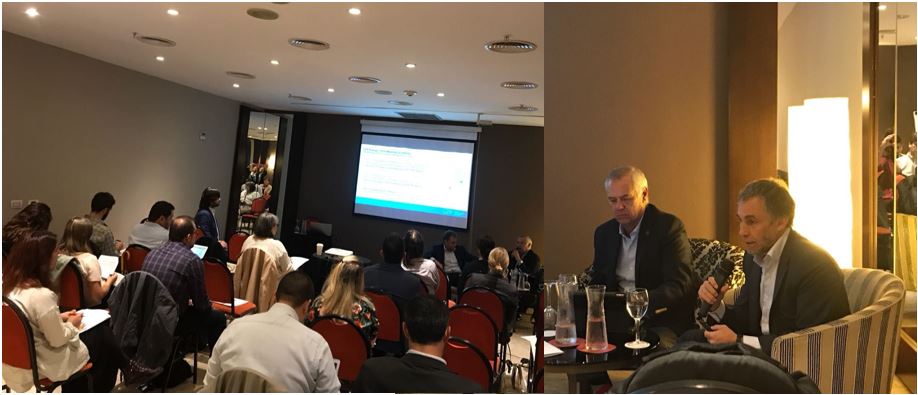Buenos Aires, 6 April 2018; Just after the face-to-face C20 meetings, Fundación Ambiente y Recursos Naturales (FARN), the Argentinian Climate Transparency partner, organized a multi-stakeholder workshop entitled “How can the Argentinian G20 Presidency promote low-carbon, climate resilient development and sustainable finance and infrastructure?”. The participants consisted of government representatives, NGOs, think tanks and Engagement Groups representatives (B20, T20, L20 and C20).
The event kicked off with welcome words from Andrés Nápoli, FARN’s Executive Director, and from Álvaro Umaña, Climate Transparency’s Co-chair and former Minister of Environment and Energy of Costa Rica.
During the first session “Long-term low emission and climate resilient development”, the Chair of the G20 Climate Sustainability Working Group, Carlos Gentile, and the Chair of the G20 Energy Transitions Working Group, Daniel Redondo, provided insights into the current developments of the working groups, followed by a discussion with the workshop participants.
“The working group is called Energy Transitions in plural because we cannot talk about just one energy transition. Every country has different sources of energy and intrinsic characteristics at the economic, social, development and technological level. However, we all agree that we need to work towards a cleaner, more transparent and flexible future in terms of energy”, stated Mr. Redondo from Ministry of Energy and Mining of Argentina.
Mr. Gentile from Ministry of Environment and Sustainable Development of Argentina shared with the participants, among other things, the key topics of the discussion for the Climate Sustainability Working Group:
- Adaptation to climate change and extreme weather events, with a focus on the development of resilient infrastructure and job creation.
- Long-term low-greenhouse gas emission development strategies, with a focus on approaches and methodologies for their design.
- Aligning international climate finance flows to the effective implementation of nationally determined contributions (NDCs) to climate change, and to long-term low-greenhouse emission development strategies.
Subsequently, workshop participants discussed how the G20 can advance long-term strategies, adaptation and job creation, renewable energy and energy efficiency. International input was provided by Jorge Villarreal from Iniciativa Climática de México and William Wills from CentroClima, Brazil. Labor union UOCRA and L20 representative, Julio Rosales, provided his expertise on job creation and just transition.
“In Mexico, the G20 has created the conditions to raise awareness on climate issues” said Mr. Villarreal from Iniciativa Climática de México.
The second session revolved around sustainable finance and infrastructure investment. Shelagh Whitley from Overseas Development Institute from the United Kingdom shared, via video call, a comparison of G20 countries in terms financing given to fossil fuels, carbon pricing schemes and fossil fuel subsidies.
In 2014, Argentina provided over 10.000 million US$ for fossil fuels. Saudi Arabia was the G20 country that spent the most, around 70.000 million US$.
Finally, Pablo Cortínez from Fundación Vida Silvestre from Argentina talked about mobilizing financial flows for the implementation of NDCs. He also made an analysis on green bonds and provided information on green finance at the global, regional and local level. After this, María Marta Di Paola from FARN gave the final expert input on phasing out fossil fuel subsidies and presented the analysis of Argentina’s Annual Public Budget, pointing out that only 0.27% of Argentina’s public budget is spent for environmental purposes.







